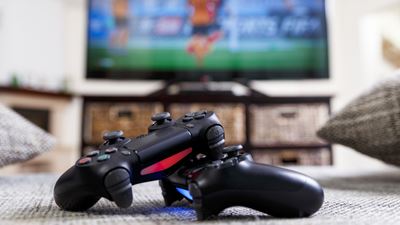Could You Have a Video Gaming Injury?
In any game, sport or exercise, when you use certain muscles or move in ways your body isn’t used to, you’re going to feel sore. Beyond typical soreness, you can develop specific ailments from frequent or repetitive motions. Tennis players can develop tennis elbow. Golfers can develop golfer’s elbow. Video gamers are no different, and with the rise in popularity of video gaming, people are coming in to see their doctors with new ailments.
Types of eGaming Injuries 
- Gamer’s Thumb: This is the common name of De Quervain’s tenosynovitis, the inflammation of the tendons that help with the extension of the thumb. It is typically caused by excessive repetitive use of the thumb. As it becomes more pronounced, you will experience pain with simple things like turning your wrist, grabbing things or making a fist.
- Carpal Tunnel Syndrome: A common condition, carpal tunnel syndrome occurs when the median nerve that travels to the hand is compressed, resulting in pain, tingling, numbness and weakness in the hand. Without treatment, symptoms typically worsen over time. However, with treatment, it is possible to slow or stop the progression.
- Neck pain: Commonly referred to as tech neck or text neck, this pain occurs from looking down at the gaming device, creating a strain on the neck. When you look forward in a neutral position, the weight of your head is about 10 to 12 pounds, but looking down at a 45- to 60-degree angle puts 50 to 60 pounds of force on the neck, causing pain. Neck pain can start with an ache, sharp pain or stiffness, and if not corrected, can lead to poor posture and increased pain in the upper back and shoulders.
- Low back pain: Sitting for a long time can cause low back pain. Muscle strain and poor posture are often the culprits. Ice and heat can help, as well as massage. Low back pain can also be caused by neck alignment, so it is essential to ensure your gaming device is at the right level so you are not hunched over or constantly looking down.
- Tendinitis of the elbow: Tendons are bands of tissue connecting muscles to bones. Swelling of the tendons is called tendinitis, and it usually results from a repeated injury to the area. Rest, wrapping and elevating the affected area, and using ice are typical initial treatments. Physical therapy, steroid injections and surgery are additional options for treatment.
- Eye strain: Watching a screen for hours can strain the eye muscles, especially if the screen has glare or the device has low screen contrast. These symptoms are typically short term and can be resolved by blinking and taking frequent breaks.
- Mental health disorders, including anxiety and addiction: Gaming can cause mental issues as well as physical ones. The World Health Organization (WHO) recognized gaming disorder as a diagnosable condition with symptoms including preoccupation with gaming, giving up other activities due to gaming and the need to spend more time gaming to satisfy the urge.
Preventing Video Gaming Ailments
Even as too much gaming can bring on negative conditions, playing video games offers many positive attributes. Playing games requires hand-eye coordination and strategy. Gaming is used in physical therapy to help both muscle and cognitive development.
Moderation is key in making sure gaming helps, not hurts. Start by making sure your gaming station is set up with proper ergonomics. Sit in a chair that supports your back, neck and arms, and make sure your device is at the right eye level so you don’t have to bend down to look at it. Take frequent breaks — every 45 minutes or so, get up and stretch. Find exercises that strengthen the core muscles to decrease muscle strain.
If you develop an injury, don’t ignore it or try to play through it. It is so important to listen to your body. If you start to have warning signs that something isn’t right, you need to figure out what the problem is so that you can prevent it from progressing. Ignoring the warning signs can lead to conditions that may require surgery and sometimes permanent nerve damage.
Take care of your body and enjoy playing the games. However, at the first sign that something may be off, take a break and figure out what the problem is.
Get a Free Guide to Prevent Sports Injuries
While exercise and sports-related activities often have a positive impact on our lives, they can also lead to serious injury. At the Orlando Health Orthopedic Institute, our multidisciplinary sports medicine team is committed to providing exceptional orthopedic care to help you return to your active, pain-free lifestyle.
Learn More










